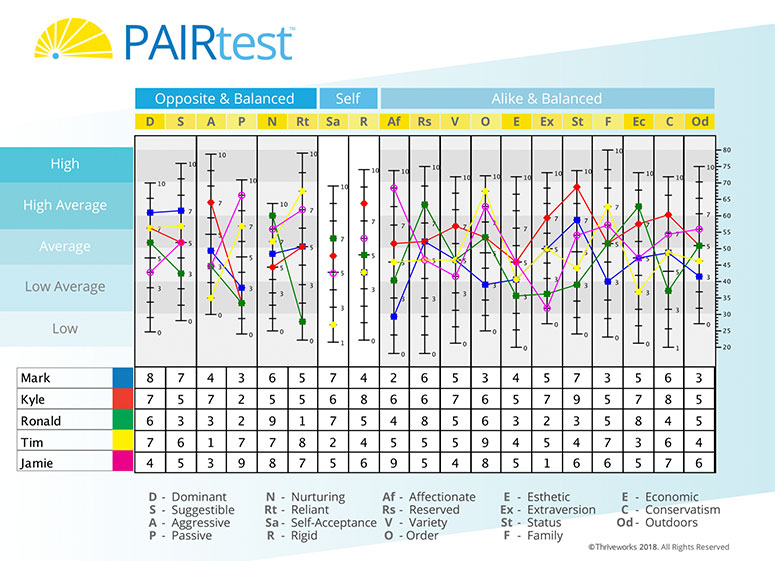FAQ
What does PAIR stand for?
PAIR stands for "Psychological Audit for Interpersonal Relationships"; or “Psychological Audit for Industrial Relations” when used in a corporate setting.
Are there right or wrong answers? Can I “fail” the test?
There are no wrong answers, and one cannot fail the test. The PAIR is composed of 190 brief statements (such as “I like warm weather”) that you can answer as either “true” or “false” based on your preferences.
Can the test diagnose me with a mental health disorder?
No. The test does not provide any type of clinical diagnosis.
How long does it take to complete the PAIR?
Most persons can complete the test in under 30 minutes.
Can an individual take the PAIR?
Yes. An individual can take the PAIR and will receive useful information on his/her personality, as well as information on ways his/her personality might impact relationships.
How do I get access to take the PAIR?
Your administrator/provider will give you an access code, which you can use to take the test. Unfortunately, you cannot take the PAIR until an approved PAIR administrator has given you an access code. To be connected with a PAIR administrator, please contact us.
How is the PAIR different from other tests?
One of the most unique things about the PAIR is that your test results can be run alongside another’s results. This creates a very powerful visual report, wherein (with your administrator’s help) you can see how you and another’s personality styles might promote relationship harmony, and areas of potential conflict. For example, if two persons both scored high on the measure “Dominant,” such might suggest a risk of conflict. Or, if two persons both score high on the measure “Variety,” such could be a positive relationship indicator.
How many personality measures does the PAIR have?
There are 19 measures. They are listed below. Please note, a high or low rating on any given scale might not measure what you think it does, so it’s important that a trained administrator provide interpretation of your scores.
- Status
- Rigid
- Family
- Extraversion
- Conservatism
- Aggressive
- Affectionate
- Economic
- Variety
- Dominant
- Nurturing
- Order
- Esthetic
- Passive
- Reliant
- Reserved
- Suggestible
- Outdoors
- Self-Acceptance
What is the history of the PAIR?
The PAIR has a long history and has been taught at universities, at the graduate level, for more than 50 years. It has been used in both clinical and corporate settings. Created in 1963, the PAIR has been regularly updated and statistically re-normed.
Is the PAIR like the Myers Briggs?
The Myers Briggs, and similar Jungian-style tests that can be found online, are simple and fun tests to explore. One might take the Myers Briggs and, using its four personality measures, learn that he/she has a personality similar to Thomas Edison or Nicola Tesla. The PAIR provides more in depth results, measure 19 personality traits. If Edison and Tesla took the PAIR, in addition to learning their personalities, they would also have learned areas of potential conflict and misunderstanding, and they might have been able to use that knowledge to protect their working relationship from its historic demise.
What does the PAIR look like?
A PAIR results report looks like this:

How can I become a PAIR test Administrator?
You can register as an administrator, or contact us for more information. Depending on your qualifications, background, and experience with the PAIR, there may be some training requirements prior to becoming an approved administrator.
